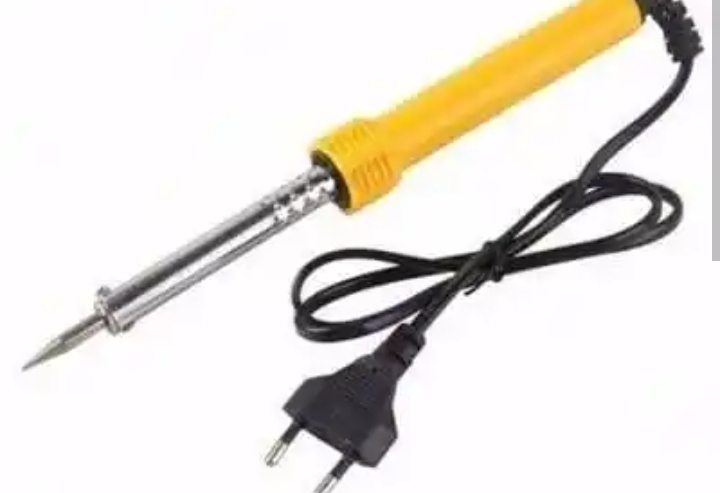Soldering iron price in Nigeria
In today’s modern world, electronics have become an integral part of our daily lives, encompassing everything from household appliances to advanced gadgets. As these devices continue to evolve, so does the need for efficient and reliable soldering techniques.
A soldering iron is an indispensable tool for electronics enthusiasts, hobbyists, and professionals alike, enabling the secure joining of components on circuit boards, repairs, and modifications. In Nigeria, with its burgeoning tech industry and growing interest in electronics, the importance of soldering iron cannot be overstated. This article explores the significance of soldering irons in electronics, the various types available in Nigeria, and their applications.
Soldering iron serves as the backbone of electronic work, as it allows the joining of components together to create functional circuits. The process involves heating a filler metal (solder) to its melting point and then cooling it, creating a strong and permanent bond between components. Without this crucial tool, it would be near impossible to assemble electronic devices, leading to unreliable connections and malfunctioning gadgets.
Table of Contents
What is a Soldering Iron?
A soldering iron is a handheld tool that generates heat at its tip, used for melting solder and attaching electronic components to circuit boards. It consists of a heating element, a handle, and a replaceable or integrated soldering tip. The tip is made of copper and is available in various shapes and sizes to suit different soldering applications.
Types of Soldering Irons Available in Nigeria
Standard Soldering Irons:
Standard soldering irons are the most basic and widely available type. They come with a fixed temperature and are suitable for simple soldering tasks. These irons are commonly used by beginners and for occasional electronic repairs. While they lack advanced features, they are cost-effective and get the job done for basic soldering needs.
Temperature-Controlled Soldering Irons:
Temperature-controlled soldering irons, also known as adjustable soldering irons, offer the advantage of controlling the tip’s temperature. This feature is essential when working with delicate components that require precise and consistent heat. Temperature control prevents overheating, reducing the risk of damaging sensitive elements on the circuit board. These soldering irons are more expensive than standard ones but are well worth the investment for professional and intricate soldering projects.
Soldering Stations:
Soldering stations are comprehensive setups that include a power unit and a detachable soldering iron with adjustable temperature controls. They often come with additional features like digital temperature displays, soldering iron holders, and cleaning sponges. Soldering stations are commonly used in industries and electronics repair shops where consistent performance and reliability are paramount.
Cordless Soldering Irons:
Cordless soldering irons are portable and battery-operated, providing convenience and flexibility for soldering in remote locations or areas without access to electricity. These irons are particularly handy for field technicians and hobbyists who need to work on the go. However, they may have limited battery life, and their temperature range might not be as extensive as traditional soldering irons.
Factors to Consider when Buying a Soldering Iron
Power Requirements
Before purchasing a soldering iron, it’s crucial to consider its power requirements. In Nigeria, the standard voltage is 230V at 50Hz, but power fluctuations are not uncommon. It is advisable to invest in a soldering iron with a stable power input range, allowing it to withstand voltage fluctuations. Additionally, understanding the power rating (wattage) of the soldering iron is important. Higher wattage irons heat up faster and are suitable for heavy-duty tasks, while lower wattage ones are ideal for delicate electronics work.
Temperature Control Features
Temperature control is a critical aspect of soldering irons, especially for intricate soldering jobs. Look for soldering irons with adjustable temperature settings to cater to various soldering tasks. Temperature-controlled irons ensure precise heat application, preventing damage to sensitive components and ensuring strong solder joints. Some advanced soldering stations offer digital temperature displays for accurate monitoring.
Tip Compatibility and Availability
The soldering iron’s tip plays a significant role in the soldering process. It should be compatible with a wide range of soldering projects, from small circuit boards to larger electrical connections. Ensure that your chosen soldering iron has interchangeable tips and that replacements are readily available in Nigeria. Common tip shapes include chisel, conical, and bevel, each designed for specific soldering tasks.
Durability and Build Quality
A durable soldering iron will last longer and provide consistent performance. In Nigeria, where environmental conditions can be challenging, it is essential to choose a soldering iron made from high-quality materials. Look for models with heat-resistant handles and sturdy metal construction. Additionally, soldering stations with ergonomic designs offer better comfort during extended use.
Best Brands of soldering iron in Nigeria
1. Weller
Weller is a renowned brand that offers a wide range of soldering irons and stations suitable for both professionals and hobbyists in Nigeria. Their products are known for their excellent temperature control, durability, and compatibility with various tips. Weller soldering irons are widely available through local electronic stores and online retailers.
2. Hakko
Hakko is another trusted name in the soldering industry, providing top-notch soldering solutions worldwide. In Nigeria, Hakko soldering irons are popular for their reliability and advanced features. They offer soldering stations with digital temperature displays, ensuring precision soldering. These products can be found in electronics shops across the country.
3. Goot
Goot offers a range of soldering irons and stations suitable for a diverse set of soldering tasks. Their products are known for their user-friendly designs and consistent performance. Goot soldering irons are available through various suppliers in Nigeria, making them accessible to both professionals and DIY enthusiasts.
4. Quick
Quick soldering stations are well-regarded for their efficiency and high-end technology. These soldering solutions are designed to meet the demands of professional soldering applications. In Nigeria, Quick soldering irons are available through specialized electronic stores and online platforms.
price of Soldering iron in Nigeria
The price of soldering iron in Nigeria varies depending on the watt, brand, and features.
A basic 60-watt soldering iron can cost anywhere from ₦2,000 to ₦4,000.
A more powerful soldering iron, such as a 150-watt soldering iron, can cost between ₦5,000 and ₦10,000.
Soldering iron kits, which typically include the soldering iron, solder, and tips, can cost anywhere from ₦5,000 to ₦20,000.
Where can I buy a soldering iron in Nigeria?
1. Onome Enterprises:
12, Olasimbo Street, Ikeja, Lagos.
2. Mamtus Nigeria:
33, Awolowo Road, Ikoyi, Lagos.
3. Aritech Nigeria Enterprises: 5, Ajose Adeogun Street, Victoria Island, Lagos.
4. Computer Village: Computer Village is a large electronics market in Ikeja, Lagos. You can find a wide variety of soldering irons at Computer Village.
Frequently asked questions about Soldering iron in Nigeria.
Q: What is a soldering iron?
A: A soldering iron is a hand tool used for joining electronic components or wires together by melting a filler metal (solder) and creating a strong electrical and mechanical bond.
Q: How much does a soldering iron cost in Nigeria?
A: The cost of a soldering iron in Nigeria can vary depending on the type and brand. Basic soldering irons may start at around ₦3,000, while more advanced models and soldering stations could range from ₦10,000 to ₦30,000 or more.
Q: What wattage soldering iron should I choose for my electronic projects?
A: The wattage of the soldering iron depends on the size and complexity of your electronic projects. For general electronics and small circuit board work, a 25-40W soldering iron is suitable. For larger and more demanding tasks, a 50-80W soldering iron is recommended.
Q: Can I use a soldering iron for other tasks besides electronics?
A: While soldering irons are primarily designed for electronics, they can also be used for other tasks like basic metalwork, jewelry making, and crafts.
Q: Are there safety precautions I should follow when using a soldering iron?
A: Yes, safety is essential when using a soldering iron. Always work in a well-ventilated area, wear safety glasses to protect your eyes, and use heat-resistant materials to avoid burns. Unplug the iron when not in use, and be cautious of hot surfaces.
Q: How do I clean and maintain my soldering iron?
A: Regular cleaning is crucial to maintain the performance of your soldering iron. Use a damp sponge or brass wire tip cleaner to remove excess solder and residue. Always tin the tip with solder before storing it to prevent oxidation.
Q: Can I replace the soldering iron’s tip when it wears out?
A: Yes, most soldering irons allow for tip replacement. You can find compatible replacement tips for your specific soldering iron model at electronics stores or online.
Q: Is it necessary to use a soldering iron stand or holder?
A: Yes, using a soldering iron stand or holder is essential. It keeps the hot iron safely in place when not in use, preventing accidental burns and minimizing the risk of fire.
Q: Can I use lead-free solder with my soldering iron?
A: Yes, you can use lead-free solder with your soldering iron. Lead-free solder is commonly used due to environmental and health concerns related to lead-based solder. Make sure to use a solder suitable for your project and the type of soldering iron you have.

